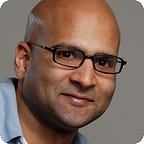America the Beautiful
When I was growing up, America was still a compelling idea. A place where anything was possible, with unimaginable entertainments and amenities, where history and identity did not matter for success — or so I naively believed at the time.
Living in 2001, it was a different epoch — our government was running a surplus, new economic opportunities (like the Internet) abounded, and while the first “dot-com” bubble had just burst, there was still a general feeling of opportunity in society- an optimism that if you worked hard enough, amazing results could be obtained.
Then September 11th happened… I had just returned from India, from my first experiences in ICTD, determined to convert my preliminary experiences with SRISTI and the Honeybee network into some kind of reasonable academic trajectory. I was young and hopeful and optimistic — I honestly believed that technology could help the world. I wasn’t exactly sure how, but I thought that we could make a difference. This was before Facebook, and Twitter, and Insta, but not before Google and Yahoo — a brief interregnum when the motto “Do No Evil” still had some meaning.
And then, the buildings. But that wasn’t what changed everything for me. What changed everything for me was how we reacted. The xenophobia, anger and violence that characterizes our society raised its ugly head in rage, and proceeded to “bunker bomb”an already destroyed society into a continued state of shrapnel-shrouded misery.
This response befuddled me. The 9/11 attacks were not conducted by a powerful state actor capable of conducting international war in anything but the most primitive ways. The specific strategy employed by the attackers was easily thwarted through increased security and protocols, as has been shown by experience. Then why immediately respond with disproportionate violence?
Everyone talks about Iraq, but nobody talks about Afghanistan, about Vietnam, about the Congo and Bengal. It didn’t have to be like this. People have lived with kindness and generosity, with composure and balance, with measured and principled applications of dangerous ideas like debt, violence, money and self-interest.
For the West, even at its most self-critical, all of this evil can be summed up in one word — Capital. As if capital operates on its own accord, directing people to lie, rape, pillage and steal to further their own interests, and all in the hopes of achieving a better and more productive society. This is the biggest lie we have all been told — that the answer somehow lies outside of us.
I do love Marx. His analysis of historical materialism, deep and profound as a response to the idealists, is descriptive of the Western way of life that has influenced the entire world. But, maybe, it is not the only way to live? Anthropological evidence suggests that humans have also been able to organize society in other ways, ways that do not make a “science” out of the worst impulses of humankind.
For Western society has shown itself to be characterized by greed, revenge, selfishness and the worst impulses that human nature has to offer. Our social sciences (including a segment of the Marxist tradition) have made a parlor game out of studying these motivations and building “models” that predict how and whether any of these worst excesses should be mitigated. Is this the best we can imagine, moments of cold reflection, bathed in the blood of destruction and pain?
This civilization (of which its science is just a part) has ruined and created hell on Earth for literally billions of people. Why isn’t the entire epistemological foundation of this society (including Marx) being held to account — all of us who are either a part of this society, or complicit with it in one way or another?
There was a time when our knowledge and ideologies had normative value. That they were useful not only for predicting human behavior, but directing it. If we assume the worst impulses out of people, is it surprising that our policies, institutions and empirical outcomes reflect that basic assumption?
How can science remove itself from this “superstructure”? How can we become an agent of change in the world, rather than a mere reflection of it, or its legitimizer and executor of power? Who could have played that role in 1968, 2001, 2003, and since then?
How much difference twenty years makes. It makes you shudder to think about 2040, if the last twenty years have been any general indication of trend. We need working institutions to stem the tide, and somehow I suspect that “data science” is not going to be an adequate response to the crisis. The technical and infrastructural advances that such advances can bring are only useful in the context of working institutions with normative intent.
In the modern context, are there any institutions that we can truly believe in? Ask yourself — if it came down to it, and all of the scaffolding of modern society came to an end, no power, no food, no Internet, no telephone — who would you turn to? Who would you believe in? The Senate? The President? The US Army? Google, NextDoor, and your local neighborhood watch committee?
